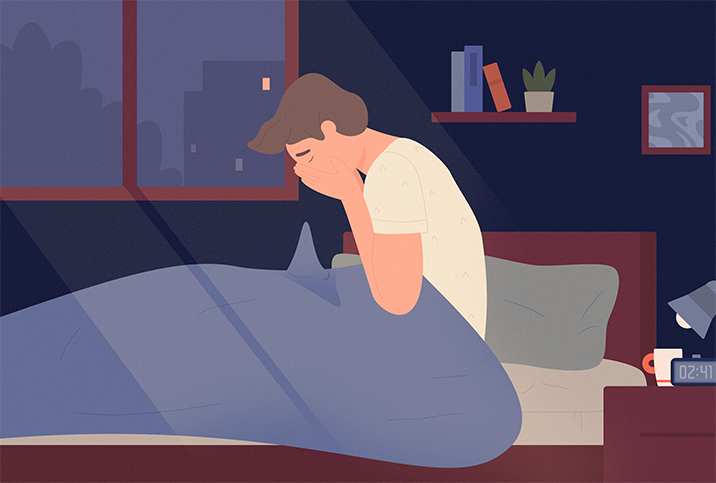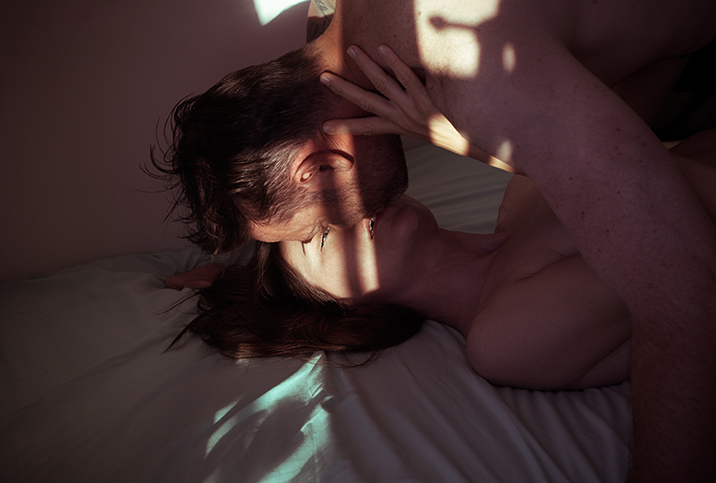Up All Night: Sleep-Related Painful Erections Are a Nightmare

Just hearing the words "painful" and "erection" might be enough to make you cross your legs. They're not two words you want to associate, right? But for some men, these two crossover often, resulting in very real problems.
Sleep-related painful erections (SRPE) is a condition that causes men to experience painful erections when asleep and normal, painless erections when awake. It's also known as painful nocturnal erections.
SRPE is considered a sleep disorder because it occurs during sleep, specifically during rapid eye movement (REM), according to Justin Dubin, M.D., a urology fellow specializing in male infertility and sexual medicine at Northwestern University.
"The penile pain is only associated with erections during sleep; people suffering from this issue never have pain in their penis while awake or during sexual activity," Dubin said.
It sounds like a pretty strange phenomenon. So what causes SRPE and how likely is it to happen?
What causes SRPE?
"SRPE is a rare condition with no apparent predisposing factors, and we don't fully understand the reason it occurs," said Petar Bajic, M.D., a urologist in the Center for Men's Health at the Glickman Urological and Kidney Institute at the Cleveland Clinic and assistant professor of urology at the Cleveland Clinic Lerner College of Medicine of Case Western Reserve University.
Research data are extremely limited because the affliction is so rare, Dubin said.
"Of the patients seen with SRPE, none have any clear anatomical or functional issues with their penis," he added.
Dubin explained the pain from erections could be caused by an increased pressure in compartments of the penis called corporal bodies, because of the increased blood flow during an erection. The increased pressure can cause "compartment syndrome" of the penis and result in a lack of additional blood flow, which leads to pain.
Other medical professionals believe there is a pelvic floor muscle aspect to SRPE. Dubin explained the increased tone of these muscles could contribute to painful erections while sleeping.
However, causes are difficult to pinpoint.
"When looking at causes, anxiety is often an associated symptom, and understandably so," Dubin said. "However, the data has not strongly linked SPRE with any psychiatric diagnoses or any other predisposing health factors."
How rare is SRPE, and why only during sleep?
Bajic noted one study stated SRPE occurs in about 1 percent of men with sexual dysfunction.
"But I think it's probably rarer than this," he said.
Dubin concurred that SRPE is a particularly rare condition, with fewer than 1 percent of patients presenting with painful nocturnal erections—though he thinks it may be a bit underreported—and an average onset age of 40 years old.
"Even normal nocturnal erections during REM sleep are still not completely understood," Dubin said. "But we do know that they are a good representation of your normal erectile function while awake. This is why when you come to a urologist, we ask if you have good morning erections."
Normal nocturnal erections are likely stimulated by the neurons involved with REM sleep patterns, Dubin said. REM sleep occurs about 60 to 90 minutes into sleep. Brain activity increases, like when you're awake, and sleep is not as deep. Experts think SRPE may be connected to problems with the neurotransmitters and neurons involved with REM sleep that trigger erections. But it's all hypothetical at this point, Dubin said.
Truthfully, even experts don't really understand why SRPE happens and why it only occurs during sleep.
Can SRPE lead to erectile issues and can it be treated?
Sleep-related painful erections is a disorder that primarily affects a person's quality of life rather than sexual function, Bajic said.
"SRPE has not been associated with long-term erectile issues," he said.
There is limited data on whether it leads to erectile issues, but Dubin said patients often struggle with anxiety, tension, irritability and fatigue—all the result of poor sleep due to waking up from, yes, painful erections.
"However, one thing that I can tell you is that lack of sleep and increased stress definitely can take anyone out of the mood for sex," he said.
Due to the rarity of the condition, Bajic explained there is no universally agreed-upon treatment, but baclofen, a muscle relaxant, is the most common choice.
A study of 133 men with bothersome nocturnal erections, including 31 suffering from SRPE, indicated baclofen was the most effective treatment option for the men with SRPE.
Various medicines have been tried in the treatment of SRPE, according to Dubin.
"Unfortunately, we do not have data on the long-term success rates of any of these medications, including baclofen," he said.
Dubin pointed to a couple of other nonpharmacological treatments for SRPE, including pelvic floor physiotherapy and psychosexual counseling.
"Overall, though, treatment practices vary, and more research needs to be done to see what the best treatment option is for these patients," he said.


















